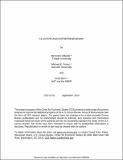Clusters and entrepreneurship
Author(s)
Delgado, Mercedes; Porter, Michael E.; Stern, Scott
DownloadStern_Clusters and.pdf (211.8Kb)
OPEN_ACCESS_POLICY
Open Access Policy
Creative Commons Attribution-Noncommercial-Share Alike
Terms of use
Metadata
Show full item recordAbstract
This article examines the role of regional clusters in regional entrepreneurship. We focus on the distinct influences of convergence and agglomeration on growth in the number of start-up firms as well as in employment in these new firms in a given region-industry. While reversion to the mean and diminishing returns to entrepreneurship at the region-industry level can result in a convergence effect, the presence of complementary economic activity creates externalities that enhance incentives and reduce barriers for new business creation. Clusters are a particularly important way through which location-based complementarities are realized. The empirical analysis uses a novel panel dataset from the Longitudinal Business Database of the Census Bureau and the US Cluster Mapping Project. Using this dataset, there is significant evidence of the positive impact of clusters on entrepreneurship. After controlling for convergence in start-up activity at the region-industry level, industries located in regions with strong clusters (i.e. a large presence of other related industries) experience higher growth in new business formation and start-up employment. Strong clusters are also associated with the formation of new establishments of existing firms, thus influencing the location decision of multi-establishment firms. Finally, strong clusters contribute to start-up firm survival.
Date issued
2010-05Department
Sloan School of ManagementJournal
Journal of Economic Geography
Publisher
Oxford University Press
Citation
Delgado, Mercedes, Michael E. Porter, and Scott Stern. “Clusters and Entrepreneurship.” Journal of Economic Geography 10.4 (2010) : 495 -518.
Version: Author's final manuscript
ISSN
1468-2710
1468-2702